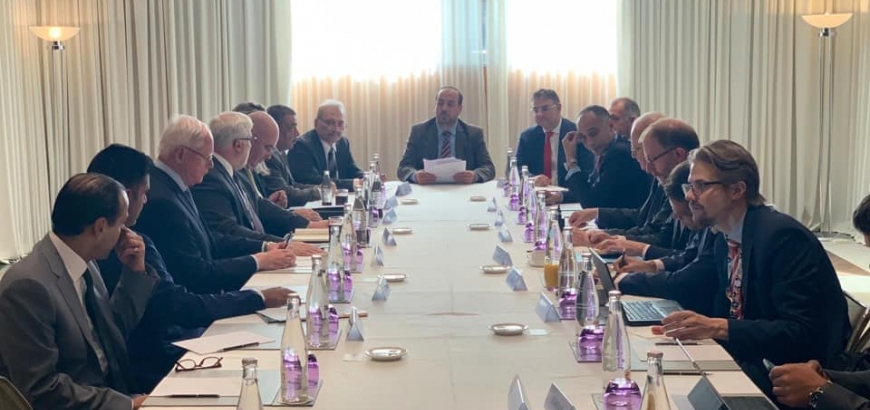Alsouria Net observed the reactions of some Syrian politicians, human rights advocates and activists regarding the announcement by the UN Secretary-General Antonio Guterres on Monday of the official formation of the constitutional committee.
Violating the “essence” of Resolution 2254
Mohamed Sabra, formerly a major negotiator in the Syrian opposition, believed that the committee would just be a tool to wipe out all the struggles and sacrifices of the Syrian revolution. He added that the problem was not in the six names nor the shares nor the presidency of the committee, but in the procedural framework under which it would operate during the discussion phase and in the legal mechanism that would put the committee into effect—that is, in transferring the outcomes of the committee into an institution legally binding for the parties.
Sabra wrote on his Facebook page that, “The constitutional committee is a material violation of Resolution 2254, which is considered the basis of the political process.” He continued, “the constitutional committee was a Russian decision passed by bringing together three forces. The first force was a portion of the opposition that went with the joint Russian-Turkish decision in Astana. The second was the unprecedented support of the previous UN envoy, de Mistura, for the Russian-Turkish option in Astana and then later in Sochi. The third was the approval of some Arab and Western countries under the pretext that a large portion of the opposition had agreed to this proposal and that those who went with the Astana option were Syrians.”
Syrian writer Amer al-Quwatli criticized the absence of Syrian revolutionary figures with a legal background on the committee, asking if they were absent or excluded.
Quwatli wrote on Facebook that, “These revolutionary national figures do not fulfill their professional duties on behalf of their organizations (which we respect and value) in this historic moment. This does not mean a professional failure or delay in assuming the responsibility they have assumed and derived from them, but it marks a political defeat.”
Meanwhile, a member of the central secretariat of the Syrian National Council, Abdel Rahman al-Hajj, said that the announcement of the constitutional committee was a declaration of the death of the High Negotiations Committee and the end of Riyadh 2’s role.
Syrian rights activist Mansour al-Omari said that those working on the formation of the committee and its members know that it will not be a step to resolving the main Syrian crisis, but would be a pretext to restore Assad’s legitimacy so that he can continue to oppress the Syrians under his control and to return refugees.
Negotiations Committee “optimistic”
Despite the criticisms levied at the constitutional committee by Syrian politicians, activists and rights advocates, the Negotiations Committee that emerged from the Riyadh 2 conference expressed optimism around the announcement of the formation of the constitutional committee.
The Negotiations Committee said in a statement on Tuesday that the formation of the constitutional committee under UN supervision to write a new constitution would “meet the aspirations of the Syrian people” and said it was a “step on the road to implementing Security Council Resolution 2254.”
The statement also said that it was “not oblivious to any of the obstacles placed by the regime under the face of the committee’s work.” It said that the constitutional committee would be the door to discussing the other contents of Resolution 2254, including releasing prisoners and forming a transitional governing body able to provide a safe and neutral environment for Syria to transition to the future, according to the statement.
Guterres had announced the constitutional committee’s formation after 20 months failing to form it after it had been proposed at the “Syrian National Dialogue” conference held in the Russian city of Sochi in January 2018.
After the official announcement of the formation of the constitutional committee by the United Nations, eyes have turned to the working mechanism it will follow—whether developing a new constitution or discussing and amending the 2012 constitution.
This article was translated and edited by The Syrian Observer. The Syrian Observer has not verified the content of this story. Responsibility for the information and views set out in this article lies entirely with the author.


